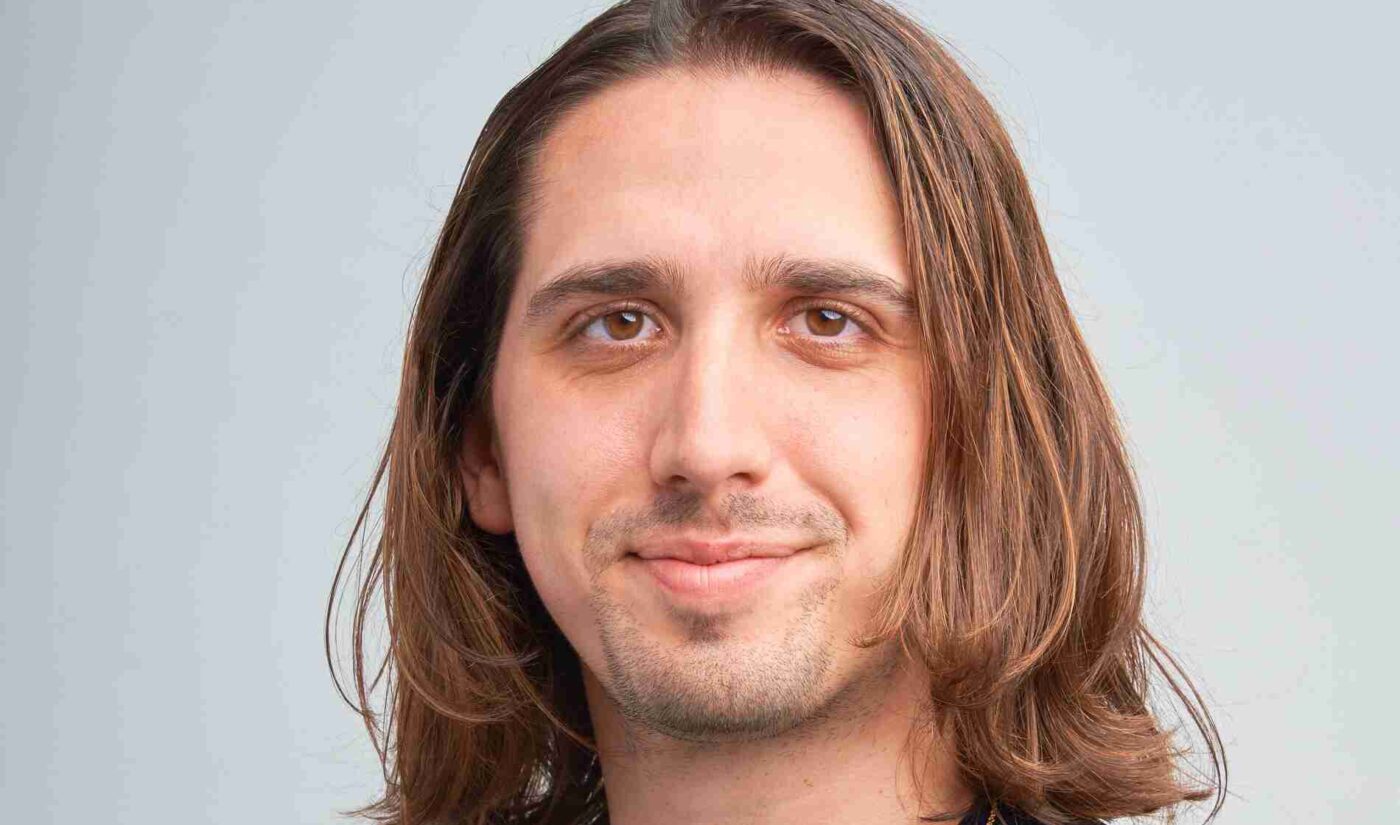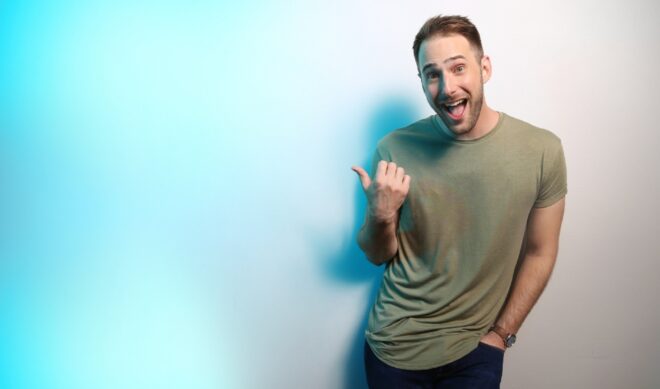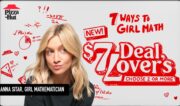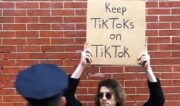Welcome to Creators on the Rise, where we find and profile breakout creators who are in the midst of extraordinary growth. You can check out previous installments here.
Zach Pozniak‘s grandfather used to say dry cleaning was a recession-proof business.
Imagine downtown, in any big American city. Now imagine the 8 a.m. rush into work: people in pressed slacks and beautiful suits, flowing skirts and high-end bags. Everyone on their way, wearing their best. This scene happened every morning across the U.S. for decade upon dependable decade. And while financial downturns might affect other, more noncompulsory industries, at the end of long days in offices, all those slacks and suits and skirts and bags needed to be cleaned. No way around it. Dry cleaning wasn’t going anywhere.

Subscribe to get the latest creator news
Until COVID.
“We lost about 85% of our business,” Pozniak, who co-owns luxury Manhattan dry cleaner Jeeves New York with his father, tells Tubefilter. His dad had been in dry cleaning for nearly 40 years, and though Pozniak went to school for mechanical engineering and had dreams of becoming an architect, he was also drawn to joining the family business. When the pandemic shuttered offices and tanked Jeeves’ traffic, he knew he had to do something.
“I was doing some research into how natural SEO and backlinking worked, and I thought it’d be really cool if we were to share information, hopefully some bigger websites would recognize that and quote us and tag our website in there,” Pozniak says. “Hopefully just get us to the top of the Google listing. While we had really nothing to do, we had no clothes to clean, I figured, let’s start just sharing our information with everybody.”
He figured video content would be a good way to complement his SEO efforts, too. “The original plan was YouTube horizontal videos. Quick, to the point, one minute, two minutes, or something long for stain removal guides. We wanted to basically be the Wikipedia of stain removal,” he says. He and his sister filmed a batch of about 10 videos covering how to remove the most common stains–things like wine, mustard, and oil.
“They did terribly,” Pozniak says. “Double-digit views. It was really, really disheartening.”
But he didn’t give up. He took a class on video editing, and in the summer of 2020, after a friend encouraged him to try uploading shorter videos on TikTok, he picked up the camera again.
“It just started hitting,” he says. First, a video where he was cleaning a suede Celine bomber jacket. Then a video where he broke down what the symbols on fabric care labels mean. People were watching–and they were asking questions. How did they clean this type of fabric? What does Jeeves do when a garment is really messed up?
Fast-forward nearly four years, and the account Pozniak created–jeeves_ny–has just over 600,000 followers. It’s become a major part of the company, with Pozniak regularly recording cleaning tips and sharing some of the items Jeeves gets in to clean (like this Gucci leather skirt with problematic metal embellishments). The business is doing well, he says: Jeeves now handles between 1,500 and 1,800 items a week (most of them luxury), moved into a new location on 93rd and Madison, is expanding its back-of-office into a bigger space in the Brooklyn Navy Yard, and is working on a book sharing exactly the sort of information Pozniak hoped to, back at the beginning of the pandemic.
Check out our chat with him below.
@jeeves_ny Replying to @corevette here’s the board, I’ll be reviewing every laundry detergent I can get my hands on 🙂 #laundry #detergent #laundrydetergent #tide #gain #persil #topgear #hotlap #performance #stain #stainremoval #drycleaning ♬ original sound – clean freakz
This interview has been edited for length and clarity.
Tubefilter: Hi there. To start off, imagine someone’s reading this and has never seen any of your stuff, is completely unfamiliar with you. Give me a little bit of background about you, where you’re from, and how you got into doing dry cleaning.
Zach Pozniak: Sure. My name is Zach Pozniak. Now I’m a dry cleaner, but I have an education in mechanical engineering. After that I worked in construction consulting for about four to five years, which gave me some really wonderful project management experience. My focus there was really high-end residential build-outs and hospitality, so hotels. My dad, Jerry, who’s been a dry cleaner for 39 years who owns Jeeves New York, now I’m a co-owner with him.
He started teasing the idea probably in 2018 and I thought it’d be a really cool opportunity. I really had no experience with laundry and dry cleaning before that, even though it was a family business for my whole life. It was definitely not the plan, but I’m really happy to be in the fabric care space.
Tubefilter: That’s amazing. Did you always know that you wanted to go into engineering?
Zach Pozniak: I really wanted to go into architecture, to be honest. My high school had a wonderful little architectural program for four years. Just one class, calling it a “program” might be exaggerating it, but that was definitely what I wanted to do. Honestly after speaking with a lot of architectural students in college and real architects, it seemed like engineering would give me a broader place for employment.
Tubefilter: Unfortunately, yes. You grew up in New York?
Zach Pozniak: It’s the only state I’ve ever lived in. I lived in Westchester County, went to school at Binghamton University, which is about three hours west of here, and then I moved to the city in 2016 and I’ve been here since.
Tubefilter: So you moved into working with the family business. When did the video aspect of things come in?
Zach Pozniak: COVID was not extremely kind to us dry cleaners. My grandpa used to say that dry cleaning was always a recession-proof business because people always need their clothes cleaned, but I guess he didn’t anticipate a global pandemic that would shut down every single office and all of our work clothing overnight. We lost about 85% of our business, we knew we had to change something up.
I was doing some research into how natural SEO and backlinking worked, and I thought it’d be really cool if we were to share information, hopefully some bigger websites would recognize that and quote us and tag our website in there. Hopefully just get us to the top of the Google listing. While we had really nothing to do, we had no clothes to clean, I figured, let’s start just sharing our information with everybody and maybe they’ll think it’s useful, because I didn’t really see a whole lot of folks who really knew what they were talking about, or trustworthy sources within the fabric care space.
Tubefilter: I remember seeing a lot of the dry cleaners in Manhattan either shut down or significantly downsize during COVID.
Zach Pozniak: It really was a really brutal test for a lot of dry cleaners. Again, a vast majority of dry cleaners are small family-owned businesses. There are really no national chains for dry cleaning. No one’s really cracked the code. There are some folks out there trying to do it, but I really firmly believe that dry cleaning is so specific to the areas and different socioeconomic people. It really needs to be malleable to the neighborhood that they’re working in.
I don’t know if that nationalization, commercialization of dry cleaning will exist. Unfortunately, too, dry cleaning is declining 3% a year just as an industry. It’s a sinking ship. We’re in the really high-end luxury space, which is definitely a bit more recession-proof. We’re the kind of folks that you take your $5,000 Valentino dress because you may not want the local guy on your corner to do it. Another saying my grandpa used to say was, “You wouldn’t take your Ferrari to a Ford dealership,” and I think the same is true for really high-end clothing that requires safety and expertise and a lot of repetitions.
Tubefilter: I just saw your video about, you had a Gucci skirt. My first job out of college was fashion and beauty, so I have a little bit of background in handling luxury clothes, but I was really curious. Your video was about how you couldn’t get the metal spangle off it because of the way it was designed. How did you end up cleaning it?
Zach Pozniak: We worked with the client and decided that we couldn’t clean it. We thought the risks outweighed any type of benefit. It’s just really unfortunate, and I think this is something that really needs to come from the top, from the industry leaders within the fashion space to make their clothing actually serviceable. These are the people that are setting the tone for the whole fashion industry and could have been a really easy fix of making it removable and not having an issue.
It’s just something where oftentimes the dry cleaner gets caught holding the bag for this. It’s always the dry cleaner’s fault, and I’m not trying to promote that messaging, but more of just wake people up to that a lot of these things don’t necessarily mean brands are looking out for their consumer after they get out of the store. It’s disappointing.
Tubefilter: How is business doing now? Did it pick up?
Zach Pozniak: Business is good.
Tubefilter: Oh, good. Okay.
Zach Pozniak: We’re growing. It’s really strong. We’re moving our back-of-house location, which is not client-facing, clients don’t know it exist. That’s where I’m in now. It handles all of our inventorying, so I’m making sure your clothes go back to you with certain tags and then inspected, that all happens here. We have a whole team dedicated to that. This is all where the completed clothes, too, for pickup and delivery, are staged before loaded onto the van. We’re moving this location into the Brooklyn Navy Yard in two weeks, which is really exciting. I love that area. It’s a wonderful space. We’re very fortunate to be there. It’s cool to be surrounded by other really interesting businesses, too, because right now we’re on an island and I think it’ll be really, really wonderful to just see people in the hallway.
@jeeves_ny Replying to @m.platinii a dry cleaners explanation of dry cleaning #dryclean #drycleaning #whatisdrycleaning #drycleaners #bo #bodyodor #laundry #cleaning #stain #smelly #stinky #explained ♬ original sound – clean freakz
Tubefilter: Where are you guys now?
Zach Pozniak: We’re up in East Harlem.
Tubefilter: Way up north.
Zach Pozniak: Yes. Way up there, but close enough to our retail store. We only have one store, which is on 93rd and Madison, but 85% of our business is pickup and delivery, which is complimentary. We’re not a huge walk-to-the-dry-cleaner kind of people, we’re definitely a destination. We deliver to just about every part of Manhattan, most parts of Brooklyn. We don’t love going super far out east, and then basically Long Island City and Astoria.
Tubefilter: How big is your overall team? Front of house, back of house, everybody.
Zach Pozniak: Front of house, back of house, Jeeves with drivers is around 20. We also have four tailors and then we have another 30 in the cleaning department, our actual processing and servicing department at our workroom, which is also in the Navy Yard. It is an enormous operation for such a low-volume cleaner. We’re really only cleaning 1,500 to 1,800 pieces a week, which in dry cleaning world is low, but we just put so much care and time into pieces.
The level of inspection is wild. Every single person who touches a garment is an inspector. If the pressing team feels that the stains aren’t removed, they send it back to cleaning and on and on and on. We’ve developed some really wonderful systems of redundancies and just checks at every single stopping point.
Tubefilter: You said you guys have a lower volume, what is a median volume you would say across the industry?
Zach Pozniak: There’s a cleaner like J’s, which has probably double digit trucks on the road. I would say it’s probably between 3,000 to 5,000 a week. 1,000 pieces a day.
Tubefilter: So a big difference.
Zach Pozniak: Yes. That’s our whole thing. We don’t really want to be doing your everyday Uniqlo jeans. If you send them to us, we’ll happily do it, but it’ll be $55, and we’re approaching the cost of the jeans. It’s for the specialty people, it’s for all specialty pieces. Things that need a little bit more love and attention.
Tubefilter: Sorry for grilling you. I’ve never actually spoken to anybody in this industry, so it’s fascinating. Very cool.
Zach Pozniak: Whatever you have. I’ve realized recently that not a lot of people meet or know dry cleaners.
Tubefilter: That’s true! I’m perma work-from-home, so I don’t have a lot of opportunities to wear business clothes. The most I remember of a dry cleaner is my mom as a kid where would take her stuff. Maybe it’s my generation.
Zach Pozniak: Yes. It’s peculiar because it was so incredibly popular in the ’50s through the ’90s because it was so good at removing cigarette smoke too.
Tubefilter: Ohh, is that why?
Zach Pozniak: The industry took a big hit when smoking was banned in bars and restaurants, offices, airplanes. Super, super good at removing cigarette odor. That was another loss, too, but that’s decades and decades past by now.
Tubefilter: Yes. That’s really interesting, though. How long has Jeeves been open?
Zach Pozniak: Jeeves is an international franchise. My dad and I own the rights to North America, and the only one actually in this whole hemisphere is New York. He purchased it–I always get the date wrong–with business partners, I think in 2007, 2008. Jeeves as a whole was started in London in 1969, 10 years later was the second branch, 1979. After that, now we’re in 17 countries, predominantly in Asia and the Middle East. The only ones in Europe there are, there used to be five, now I think it’s two or three in London. Yes, predominantly in the Asian continent.
When my dad’s partnership with his business partners broke up, he went from the mid-market cleaner that his dad and mom owned, which was down in Gramercy, called Cameo Cleaners. He was like, “You know what? I’d really like to give the luxury end a shot. I think I’d really excel there.” He’s up five or six times the revenue when he got it, which is absolutely amazing. I like to think I brought a bit of a modern touch with some of our processes and engineering background to just get the right people in the right seats.
Tubefilter: Have you guys thought about expanding a different location in the US?
Zach Pozniak: Yes, we’ve had some series inquiries about the wealthier parts of Florida, Palm Beach, some areas of Miami, Los Angeles. It’s just so tricky because we’re such a heavy pickup and delivery model that’s something like Los Angeles, nightmare, absolute nightmare. I don’t think we could do it. Again, we can’t just pick up our cleaning team, which has decades and decades of experience, and just move them across the country. We’d have to start fresh, and that just scares me incredibly.
Tubefilter: Understandably.
Zach Pozniak: We do have an enormous amount of shipping clients, which blows my mind every time I see the size of boxes that people send us, because they’re in Michigan, they don’t trust their local guy, so they ship it across the country to us and we ship it back in wardrobe boxes on hangers and that works for some people. That’s super, super cool.
Tubefilter: Yes, I would imagine with luxury clientele, people are happy to pay for that kind of thing.
Zach Pozniak: Yes. They can afford it and they trust us and it all works out.
Tubefilter: I was thinking about how your engineering background must feed really well into this. How have you helped bring the company up to more modern processes?
Zach Pozniak: I think it’s funny, looking back on it. One of the simplest things would be like everyone at work has their own personal email address. That was the first thing I did. We were all sharing the client services email, which made task management very difficult. For a long time, Jeeves was at 39 East 65th Street, which was between Park and Madison. Tiny, tiny little store. We called it “the submarine” because it was down a couple steps. Basically just had a front glass door and that was the only window, but every single person was doing every single task.
Every person was talking to clients to schedule pickups and collections, and also problem solve when things weren’t great, but also taking clients’ clothes off the trucks and having to inspect them, detail them, add them to clients’ profiles, everything. Everyone was doing everything. I was like, “You know what, we have some folks who are unbelievable with clients, have incredible charisma. I really want them to dedicate their time to perfecting that art of customer service and not really have to be bogged down with this busy work of inspection and data entry.”
There were some folks who really preferred more of that back-of-house heads-down role to avoid talking to clients. Another silver lining from COVID was that we were able to take our business down to the bare bones and rebuild it, and that’s what we did. We signed the space that I’m currently in. Oof, it was brutal. We signed the lease in February of 2020. Tough timing to take on a new lease. Getting the construction done early March was also brutal, but we got it done and we were able to move there.
Now we have a dedicated six-person customer service team. That’s all they handle because, again, we get very peculiar requests at times and need to turn around things in a day or two, even though our turnaround time is a week. If you were to drop off your clothes today, Wednesday, they’d be back to you the following Wednesday. We have the back-of-house team that works with the drivers and makes sure that all the bags go to the right people and they’re inspected, and those people now have more time to make sure that if there’s a hole here, it gets repaired or reach out to the client because some of our clients have their own tailors and they’d want their tailor to do it.
Just really splitting it up and making sure that people should be doing what they want to be doing. I think that was the biggest thing. We moved our store about two years ago up to 93rd and Madison. Now we have much more foot traffic because we’re actually on an avenue and not down steps. I think the biggest thing was just how we actually process people’s requests and clothing.
@jeeves_ny Is DIY laundry detergent worth it? Not really #diylaundrydetergent #laundry #felsnaptha #washingsoda #borax #diydetergent ♬ original sound – clean freakz
Tubefilter: Very cool. When did you know that this new video venture of yours was going to work out, or when did you see early interest?
Zach Pozniak: The original plan was YouTube horizontal videos. Quick, to the point, one minute, two minutes, or something long for stain removal guides. We wanted to basically be the Wikipedia of stain removal, because I didn’t really see any content that I thought was tried and true or actually backed by someone who knew what they were talking about. We made about 10 of the most common stains, red wine, mustard, tomato sauce, oil.
They did terribly. Double-digit views. It was really, really disheartening, because my sister and I poured in an unbelievable amount of time and effort. I took a class in Premiere to learn how to do video editing. It sucked. That was in the summer of 2020 and that’s probably when TikTok was getting going, and a friend of mine was like, “You really should convert these to short-form TikTok videos, maybe get them to be like 20 seconds, 30 seconds,” and it just started hitting.
The first video that did really well was me overhead shot of cleaning a suede Celine bomber jacket for one of our clients, doing it entirely by hand. That was great. The one that really, really took off and got us some notoriety was just explaining the care label. What those tricky symbols mean. Now your iPhone can read it for you. Look how far we’ve come in just three years.
Now we can expand to what you and I were talking about before, of calling out fashion brands to make their stuff a bit easier to service. Talking about laundry myths, like does seltzer really have any better cleaning properties than water if you spill something on yourself? Things we’ve all heard for decades, but are they actually true? It was a pretty quick start into it, and we’ve had some pretty continued growth. YouTube finally welcomed us with some nice numbers in August of this year. Almost exactly three years after we started on YouTube, they deemed us worthy. Instagram’s been really strong too.
Tubefilter: Interesting! I find a lot of people really struggle to come from TikTok to YouTube. For some reason, something doesn’t click from one audience to the next. Very strange, because I feel your videos are naturally built to do really well on YouTube. The topics are really popular.
Zach Pozniak: That’s what I thought. You’re saying people struggle from going from TikTok to YouTube?
Tubefilter: Actually, vice versa too as well. I hear consistently that videos which do really well on TikTok will not do well on YouTube, and videos that do really well on YouTube Shorts will not do well on TikTok. For some reason, there’s some disconnect between the audiences on both platforms.
Zach Pozniak: Yes, I agree. It’d be interesting for me to do a deeper dive into some videos that did really well on YouTube. YouTube loves my behind the scenes videos for the dry cleaning processes, but some of the stain removal guides, nothing. It’s just one of those things, I don’t think any creator could ever really tell you if a video is going to hit. I would never bet my life savings on a video. Even stuff I’ve poured days and weeks into doesn’t do anything, and then something I put together in five minutes because I needed a filler for a day just gets millions of views. I don’t know.
Tubefilter: It’s funny like that. What does your work day look like now that you’re balancing videos and the business?
Zach Pozniak: I start every day at our store. I’m lucky enough to be able to walk to work. I live on the Upper East Side, walk to 93rd and Madison. That’s usually when most of our client issues pop up because, again, we’re pick up and delivery, and our drivers start really early in the morning because there’s less traffic and traffic cops. That was our drivers’ idea, and they enjoy starting at 3:00 and being done by 10:00. It works better for them.
Clients get their clothes back. I’m the last stop of customer service. If our regular CSR, customer service representative, isn’t able to handle it, gets kicked up to a senior person, then it goes to a manager, then it goes to me if things are really not going well. I usually like to start there depending on how in the weeds we are, working up there for a couple of hours.
Today I was only there for 20 minutes because I wanted to do my detergent performance testing. These are swatches I make to figure out how good a detergent is. I ran two today. Today I have been doing an unbelievable amount of hand cleaning, cleaning this guy’s suede shoes with a little bit of dye transfer from his jeans.
I do all of our very unique things to clean. I clean the handbags, shoes, mattress toppers, cushions, things that you can’t put in the machine, they need to be done entirely by hand and require a lot of concern because they’re extremely expensive and one wrong turn could cause some serious issues. Usually at the end of my day is when I do most of my editing and shooting because that’s also when it’s quieter.
Tubefilter: Do you do all your editing yourself?
Zach Pozniak: I do.
Tubefilter: You mentioned you took a class on Premiere?
Zach Pozniak: I think what I’m doing in Premiere is a tiny bit of color, some audio, putting things together. It’s pretty straightforward and, luckily, I’m very fortunate that what the audience enjoys is within my bounds of Premiere, that I don’t need to have aftereffects and crazy intros and graphics and things like that. It’s to the point, it’s very educational, no fluff. I do all my editing myself.
Tubefilter: Obviously you guys are gearing up for this big move, but do you have any other plans or goals you’re looking forward to for the business and for your videos for the next year or so?
Zach Pozniak: Yes. With Jeeves, I really, really like where we’re at. I think our team is unbelievable. We’ve spent the last three years really trying to find more career driven folks because we’ve had a real serious issue with just being a revolving door. It’s such a unique industry where training really to be comfortable on the phone with a client who as a concern takes months because you need to understand the different types of clothing and cleaning options, and what goes on with it.
We’re really looking for people that are in it for the long haul because of how much education goes into it. I’m really happy with our team. I think we need one more driver. I think we need one more person every department, a tailor, a driver, back-of-house, front-of-house to really be truly redundant, because that’s I think where my engineering brain comes into play, where it’s like, “Well–“
Right now we have three drivers. If I have two drivers call out right now, that’s a big problem, but if I have four drivers and two drivers call out, we’re in a tough spot but we’ll figure it out one way or another. I think just a tiny bit more growth and if we have the growth that we’ve had the last two years, I think we can get to that point where Jeeves can really become self-sufficient with the people that we have, which will allow me to continue some really interesting endeavors that have popped up because of TikTok and short-form videos, and the connections that I’ve made.
For example, we have a book coming out in October that I just got the proofs for 10 minutes before you and I started chatting, about how to do laundry. Just to the point, no anecdotes, no stories. Just, you’re an alien that landed on earth, how do you get your clothes cleaned? Big appendix for the top 60 stains you’ll encounter in your life. Some tips on how to clean just about every garment you’ll come across, how to use a washing machine, what’s different at a laundromat, things like that. Just really guide for anyone who’s learning how to do laundry or really wants to perfect their craft and take it to the next level.
That, I’m really, really excited about. That was a huge effort, mostly by my dad, to get that done. That’s the biggest thing that I’m super, super pumped about.
Tubefilter: Congratulations! Keep us in the loop when it comes out. Is there anything else you want people to know about you, your family, and your business?
Zach Pozniak: I think the biggest thing is just that all education is relative, and that includes laundry. It’s just one of those things that’s always passed down through spoken word. It’s never too late to learn something new and perfect your craft and get a little better, or maybe unlearn something that you thought was super useful that may be damaging your clothing. Things keep evolving. I learn every day.
I love when people ask me questions and really push it and say, “Are you sure?” Things like that, and then I’m able to reach out to experts in the field because I feel like I’m a representative of the audience often. I don’t have all the answers, but I promise you that I will find them to the best of my ability from people that are much, much smarter than I am.














